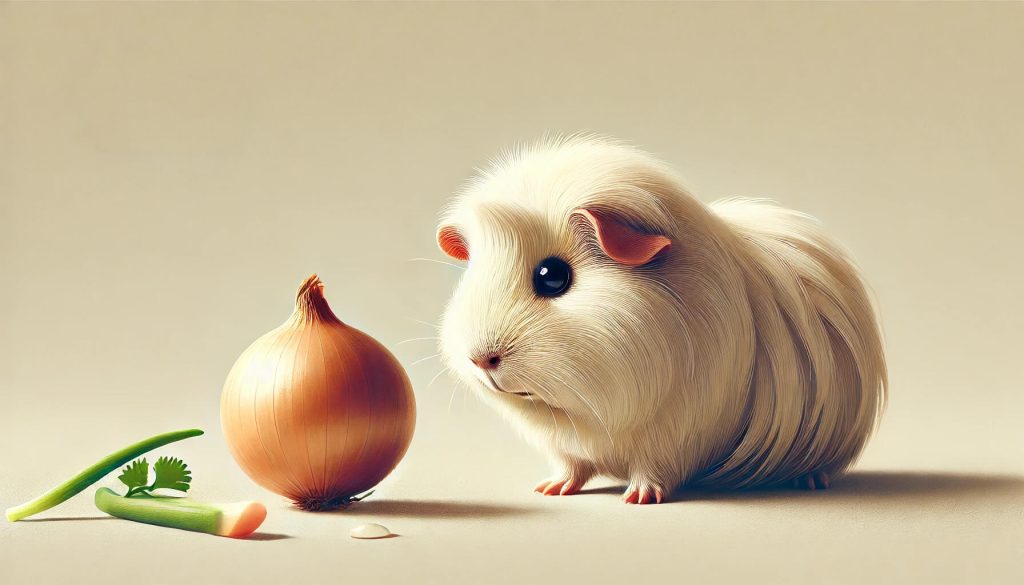
Can Guinea Pigs Eat Onions?
Understanding a Guinea Pig’s Diet
A healthy guinea pig diet includes specific foods that meet their nutritional needs. Knowledge of these foods ensures your pet’s well-being and longevity.
What Do Guinea Pigs Typically Eat?
Guinea pigs primarily eat hay, which is essential for their digestive health. Timothy hay, orchard grass, and meadow hay are suitable options. They also eat fresh vegetables like bell peppers, cucumbers, and carrots, and fruits such as apples and strawberries in limited amounts. Pellets formulated for guinea pigs provide additional nutrients.
Why Nutrition is Important for Guinea Pigs
Proper nutrition is crucial for your guinea pig’s overall health. It prevents diseases such as scurvy, which results from a lack of vitamin C. Fresh vegetables, specialized pellets, and occasional fruits provide the necessary vitamins and minerals. Ensuring the right balance in their diet supports their digestive system and keeps their teeth healthy.
Can Guinea Pigs Eat Onions?
Guinea pigs can’t eat onions. Onions contain toxic compounds that pose severe health risks to guinea pigs.
The Risks of Feeding Onions to Guinea Pigs
Onions contain disulfides and thiosulfates that can disrupt red blood cells in guinea pigs. This disruption may lead to hemolytic anemia. Consuming even a small amount of onion can lead to digestive distress and increased vulnerability to infections. It’s crucial to avoid any form of onions, including raw, cooked, and powdered.
Signs of Toxicity in Guinea Pigs
Signs of onion toxicity appear quickly. Look for symptoms like weakness, lethargy, loss of appetite, and pale or jaundiced gums. Additionally, some guinea pigs may experience diarrhea, vomiting, or difficulty breathing. If you suspect ingestion, contact your veterinarian immediately for intervention. Prompt treatment is essential for recovery.
Safe Alternatives to Onions in a Guinea Pig’s Diet
Guinea pigs thrive on a diet that excludes onions due to their toxic nature. Instead, consider safer and nutritious alternatives.
Recommended Vegetables and Fruits
Focus on vegetables that support guinea pig health:
- Bell Peppers: Great vitamin C source necessary for guinea pigs.
- Carrots: Provide fiber and vitamins while being low in oxalates.
- Cucumbers: Hydrate your pet and maintain low calories.
- Leafy Greens: Romaine, kale, and spinach offer essential nutrients in moderation.
Add fruits in small quantities:
- Apples: Remove seeds and provide vitamin C.
- Blueberries: Antioxidants help prevent cell damage.
- Strawberries: Offer vitamins but control portions due to sugar content.
- Pears: Limited amounts provide fiber and vitamins.
- Onions: Cause severe health issues like hemolytic anemia.
- Garlic: Similar to onions, poses toxicity risks.
- Potatoes: High starch content can disrupt digestion.
- Avocado: Contains persin, toxic to guinea pigs.
- Rhubarb: High oxalic acid content leads to toxicity.
- Iceberg Lettuce: Low nutritional value, may cause diarrhea.
- Chocolate: Contains theobromine, lethal to guinea pigs.
Conclusion
Ensuring your guinea pig’s diet is free from harmful foods like onions are crucial for their health. Always prioritize safe and nutritious options like bell peppers, carrots, cucumbers, and leafy greens. Remember to avoid other toxic foods such as garlic, potatoes, and chocolate. By being mindful of what you feed your guinea pig, you’ll help them live a long and healthy life.
